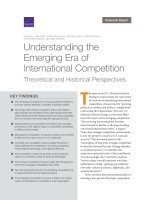| 来源类型 | Research Reports
|
| 规范类型 | 报告
|
| DOI | https://doi.org/10.7249/RR2726
|
| 来源ID | RR-2726-AF
|
| Understanding the Emerging Era of International Competition: Theoretical and Historical Perspectives |
| Michael J. Mazarr; Jonathan Blake; Abigail Casey; Tim McDonald; Stephanie Pezard; Michael Spirtas
|
| 发表日期 | 2018
|
| 出版年 | 2018
|
| 页码 | 47
|
| 语种 | 英语
|
| 结论 |
- The emerging competition is likely to be most intense between a handful of specific states with status grievances and countervailing regional and global coalitions, including the wider international community.
- The hinge point of the competition will be the relationship between the architect of the rules-based order (United States) and the leading revisionist peer competitor that is involved in the most specific disputes (China).
- Global patterns of competition are likely to be complex and diverse, with distinct types of competition prevailing in different issue areas.
- Managing the escalation of regional rivalries and conflicts — and keeping the United States from being drawn into them in service of secondary interests — is likely to be a major focus of U.S. statecraft.
- Currently, the competition seems largely focused on status grievances or ambitions, economic prosperity, technological advantage, and regional influence rather than conquest or the conscious, intentional resort to large-scale war.
- The competition is likely to be most intense and persistent in nonmilitary areas of national advantage — and the targeting of other societies with such means creates emerging and poorly understood escalatory risks.
- The postwar multilateral order provides the essential framework in which the emerging competition will unfold.
- Two flashpoints for the emerging competition lie in regional territorial and influence claims and in the growing tendency of authoritarian states to seek to extend their reach and control beyond their borders.
- The emerging era is likely to involve a drawn-out combination of contestation, competition, and cooperation in which "winning" or "victory" is the wrong mental model.
|
| 摘要 |
- The mindset for the emerging era should be more of management than of something to be won.
- This same mindset is likely to be required on many subsidiary challenges — the contest against extremism, global trade disputes, and others.
|
| 主题 | Global Security
; International Diplomacy
; International Trade
; Military Strategy
|
| URL | https://www.rand.org/pubs/research_reports/RR2726.html
|
| 来源智库 | RAND Corporation (United States)
|
| 引用统计 |
|
| 资源类型 | 智库出版物
|
| 条目标识符 | http://119.78.100.153/handle/2XGU8XDN/108949
|
推荐引用方式
GB/T 7714 |
Michael J. Mazarr,Jonathan Blake,Abigail Casey,et al. Understanding the Emerging Era of International Competition: Theoretical and Historical Perspectives. 2018.
|
|
文件名:
|
x1548190353478.jpg
|
|
格式:
|
JPEG
|

|
文件名:
|
RAND_RR2726.pdf
|
|
格式:
|
Adobe PDF
|
除非特别说明,本系统中所有内容都受版权保护,并保留所有权利。